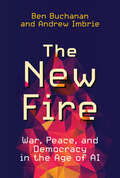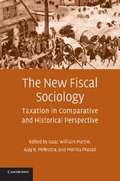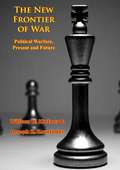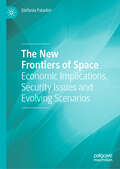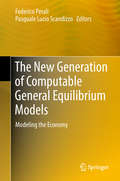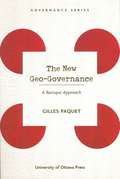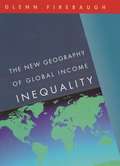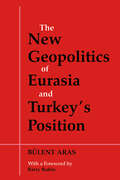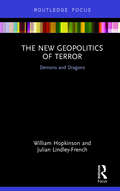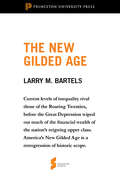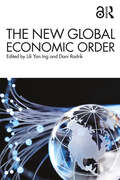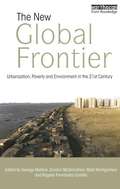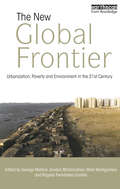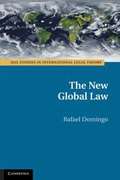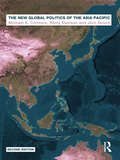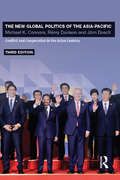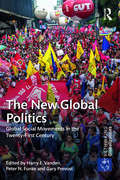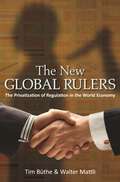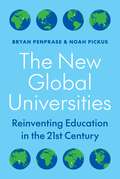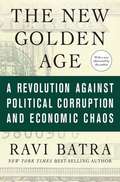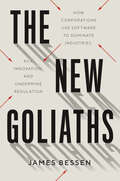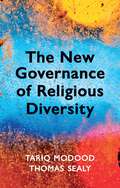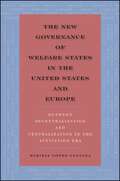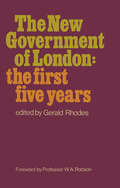- Table View
- List View
The New Fire: War, Peace, and Democracy in the Age of AI
by Ben Buchanan Andrew ImbrieAI is revolutionizing the world. Here&’s how democracies can come out on top.Artificial intelligence is revolutionizing the modern world. It is ubiquitous—in our homes and offices, in the present and most certainly in the future. Today, we encounter AI as our distant ancestors once encountered fire. If we manage AI well, it will become a force for good, lighting the way to many transformative inventions. If we deploy it thoughtlessly, it will advance beyond our control. If we wield it for destruction, it will fan the flames of a new kind of war, one that holds democracy in the balance. As AI policy experts Ben Buchanan and Andrew Imbrie show in The New Fire, few choices are more urgent—or more fascinating—than how we harness this technology and for what purpose. The new fire has three sparks: data, algorithms, and computing power. These components fuel viral disinformation campaigns, new hacking tools, and military weapons that once seemed like science fiction. To autocrats, AI offers the prospect of centralized control at home and asymmetric advantages in combat. It is easy to assume that democracies, bound by ethical constraints and disjointed in their approach, will be unable to keep up. But such a dystopia is hardly preordained. Combining an incisive understanding of technology with shrewd geopolitical analysis, Buchanan and Imbrie show how AI can work for democracy. With the right approach, technology need not favor tyranny.
The New Fiscal Sociology: Taxation In Comparative And Historical Perspective
by Isaac William Martin Ajay K. Mehrotra Monica PrasadThe New Fiscal Sociology: Taxation in Comparative and Historical Perspective demonstrates that the study of taxation can illuminate fundamental dynamics of modern societies. The sixteen essays in this collection offer a state-of-the-art survey of the new fiscal sociology that is emerging at the intersection of sociology, history, political science, and law. The contributors include some of the foremost comparative historical scholars in these disciplines and others. They approach the institution of taxation as a window onto the changing social contract. Their chapters address the social and historical sources of tax policy, the problem of how taxes persist, and the social and cultural consequences of taxation. They trace fundamental connections between tax institutions and macrohistorical phenomena - wars, shifting racial boundaries, religious traditions, gender regimes, labor systems, and more.
The New Frontier of War: Political Warfare, Present and Future
by William R. Kintner Joseph Z. KornfederThis exploration of Soviet communist political maneuvering was written in 1962 at the height of the Cold War by the then professor of Political Science at the University of Pennsylvania and the former leader of the American Communist Party. With examples from recent history the authors show how the inner workings of the Soviet machine differ from the popular idea of how communists proceed. The book also details how the Western World could formulate counter-strategies to the Communist political attacks, assaults and infiltrations.
The New Frontiers of Space: Economic Implications, Security Issues and Evolving Scenarios
by Stefania PaladiniThere are few industries in today’s world as dynamic and dramatically changing as the space sector, with new ventures and initiatives being announced on a daily basis. As well as emerging countries improving their launching and manufacturing capabilities, private actors are beginning to join public bodies in the space race, and participating in what is frequently being referred to as the new space era. With fantastic opportunities arising for business and economics, this book provides a comprehensive overview of the space sector, exploring recent initiatives, and the most important areas of investment in the industry, including emerging fields of activities such as asteroid mining and space tourism. It also addresses traditional and non-traditional security issues in the sector, together with discussing their legal implications. This interdisciplinary book provides insights for practitioners and researchers alike, particularly those involved in technology and innovation management, emerging markets, international relations, and security studies.
The New Generation of Computable General Equilibrium Models: Modeling The Economy
by Federico Perali Pasquale Lucio ScandizzoThis book covers some important topics in the construction of computable general equilibrium (CGE) models and examines use of these models for the analysis of economic policies, their properties, and their implications. Readers will find explanation and discussion of the theoretical structure and practical application of several model typologies, including dynamic, stochastic, micro-macro, and simulation models, as well as different closure rules and policy experiments. The presentation of applications to various country and problem-specific case studies serves to provide an informed and clearly articulated summary of the state of the art and the most important methodological advancements in the field of policy modeling within the framework of general equilibrium analysis. The book is an outcome of a recent workshop of the Italian Development Economists Association attended by a group of leading practitioners involved in the generation of CGE models and research on modeling the economy and policy making. It will be of interest to researchers, professional economists, graduate students, and knowledgeable policy makers.
The New Geo-Governance: A Baroque Approach (Governance Series)
by Gilles PaquetOver the last few decades, the Westphalian nation-state has lost its hegemonic position in the system of geo-governance. A dispersive revolution has led to the emergence of powerful newly networked business organizations, new subsidiary-focused governments, and increasingly virtual, elective, and malleable communities. This in turn has led to the crystallization of distributed governance regimes, based on a wider variety of more fluid and always evolving groups of stakeholders. In The New Geo-Governance, Gilles Paquet develops a general conceptual framework to deal with the new evolving reality of global governance. He uses this framework to critically examine the evolving territorial governance (hemispheric governance, meso-innovation systems, smart city-regions) and tackles the more complex governance challenges raised by sustainability and common-property resources like oceans. Paquet further explores the implications of this emerging polycentric geo-governance on the new forms of stewardship and its impact on citizenship, federalism, and other technologies of coordination, and reflects on the sort of subversive bricolage required if the missing mechanisms for effective coordination are to be put in place. The New Geo-Governance will be of great interest to students and scholars interested in governance, organizational design, international affairs, and political studies.
The New Geography of Global Income Inequality
by Glenn FirebaughThe surprising finding of this book is that, contrary to conventional wisdom, global income inequality is decreasing. Critics of globalization and others maintain that the spread of consumer capitalism is dramatically polarizing the worldwide distribution of income. But as the demographer Glenn Firebaugh carefully shows, income inequality for the world peaked in the late twentieth century and is now heading downward because of declining income inequality across nations. Furthermore, as income inequality declines across nations, it is rising within nations (though not as rapidly as it is declining across nations). Firebaugh claims that this historic transition represents a new geography of global income inequality in the twenty-first century. This book documents the new geography, describes its causes, and explains why other analysts have missed one of the defining features of our era—a transition in inequality that is reducing the importance of where a person is born in determining his or her future well-being.
The New Geopolitics of Eurasia and Turkey's Position
by Bulent ArasThis work explores the geopolitical struggles that are currently underway in the newly independent states of the Caucasus region, showing how many players in the region are coalescing into two opposing blocs. The growing political, military and economic ties amongst the countries of these two blocs stem from a number of developments in the region, most notably the fall of the Soviet Union, and consequently the end of the Cold War and its bi-polar global alliance structure. These blocs are competing for influence in the region, and the rights to exploit and transport the rich energy resources that have been found in the Caspian Sea. The text shows how many actors have been willing to co-operate in other non-energy related issues, in the hope of receiving a financial reward when countries do decide on these matters.
The New Geopolitics of Natural Gas
by Agnia GrigasAs the United States aggressively expands its exports of liquefied natural gas, it stands poised to become an energy superpower. This unanticipated reality is rewriting the conventional rules of intercontinental gas trade and realigning strategic relations among the United States, the European Union, Russia, China and beyond, as Agnia Grigas shows.
The New Geopolitics of Terror: Demons and Dragons
by Julian Lindley-French William HopkinsonThe New Geopolitics of Terror examines the impact of global reach terror on states. This book surveys the current crises and tensions in the Middle East, focussing primarily on the upheavals in Syria and Iraq, and the interaction between groups, such as Al Qaeda and ISIS state actors and Western security. It explains the threat to Western interests and states from wide-reaching Islamic terrorism, geopolitical intervention by outside actors and regional power struggles. It critiques the inadequate political, military and diplomatic responses from Western powers, and the lack of effective leadership, highlighting the potential dangers should the West fail to remedy these. The book also identifies the difficulties and dangers of continued Western involvement in the Middle East, and proposes specific actions and interventions in order to prevent further deterioration in the region and in Western societies. Specifically, the book calls for a grand strategy underpinned by political ambition that combines diplomatic, political, economic and military measures, calls for effective counter-terrorism measures in more resilient Western societies, and highlights the importance of the role that global players outside those regions can and must play if peace is to be restored. Written by two leading scholars, this book will be of much interest to students of terrorism studies, strategic studies, defence studies, Middle Eastern politics and IR in general.
The New Gilded Age: From Unequal Democracy (Princeton Shorts #8)
by Larry M. Bartels"We are the 99%" has quickly become the slogan of our political era as growing numbers of Americans express concern about the disappearing middle class and the ever-widening gap between the super-rich and everyone else. Has America really entered a New Gilded Age? What are the political consequences of the growing income gap? Can democracy survive such vast economic inequality? These questions dominate our political moment--and Larry Bartels provides answers backed by sobering data. Princeton Shorts are brief selections taken from influential Princeton University Press books and produced exclusively in ebook format. Providing unmatched insight into important contemporary issues or timeless passages from classic works of the past, Princeton Shorts enable you to be an instant expert in a world where information is everywhere but quality is at a premium.
The New Global Economic Order
by Dani Rodrik Lili Yan IngAs anti-globalization reshapes the world, the divide between East and West, developed and developing countries, and North and South, deepens, creating new challenges for economic policy and global governance. This book provides a nuanced and balanced analysis of economic transformation over the past century, exploring critical themes such as structural change, resource mobilization, and the future of global growth.Featuring insights from leading economists, this volume offers expert commentary on economic transformation, development strategies, and the evolving global order. It further examines into pressing governance questions surrounding AI, green technology, and the financing of health crises, future pandemics, and energy transitions.A vital resource for economists, policymakers, and researchers, this book provides strategic guidance on navigating global shifts and mobilizing resources to drive sustainable development in an emerging new global economic order.
The New Global Frontier: Urbanization, Poverty And Environment In The 21st Century
by George Martine Gordon Mcgranahan Mark Montgomery Rogelio Fernandez-CastillaThe world's developing countries will be experiencing massive increases in their urban populations over the 21st century. If managed intelligently and humanely, this growth can pave the way to sustainable development; otherwise, it will favour higher levels of poverty and environmental stress. The outcome depends on decisions being made now. The principal theme that runs through this volume is the need to transform urbanization into a positive force for development. Part I of this book reviews the demography of the urban transition, stressing the importance of beneficial rural-urban connections and challenging commonly held misconceptions. Part II asks how urban housing, land and service provision can be improved in the face of rapid urban expansion, drawing lessons from experiences around the world. Part III analyses the challenges and opportunities that urbanization presents for improving living environments and reducing pressures on local and global ecosystems. These social and environmental challenges must be met in the context of fast-changing demographic circumstances; Part IV explores the range of opportunities that these transformations represent. These challenges and opportunities vary greatly across Africa, Asia and Latin America, as detailed in Part V. Published with IIED and UNFPA
The New Global Frontier: Urbanization, Poverty and Environment in the 21st Century
by George Martine Mark Montgomery Gordon McGranahan Rogelio FernThe worlds developing countries will be experiencing massive increases in their urban populations over the 21st century. If managed intelligently and humanely, this growth can pave the way to sustainable development; otherwise, it will favour higher levels of poverty and environmental stress. The outcome depends on decisions being made now. The principal theme that runs through this volume is the need to transform urbanization into a positive force for development. Part I of this book reviews the demography of the urban transition, stressing the importance of benefi cial rural-urban connections and challenging commonly held misconceptions. Part II asks how urban housing, land and service provision can be improved in the face of rapid urban expansion, drawing lessons from experiences around the world. Part III analyses the challenges and opportunities that urbanization presents for improving living environments and reducing pressures on local and global ecosystems. These social and environmental challenges must be met in the context of fast-changing demographic circumstances; Part IV explores the range of opportunities that these transformations represent. These challenges and opportunities vary greatly across Africa, Asia and Latin America, as detailed in Part V. Published with IIED and UNFPA
The New Global Law
by Rafael DomingoThe purpose of this book series is to clarify and improve the theoretical foundations of international law. Too often the progressive development and implementation of international law have foundered on confusion about first principles. This series will raise the level of public and scholarly discussion about the structure and purpose of the world legal order and how best to achieve global justice through law.
The New Global Politics of the Asia Pacific
by Michael K. Connors Rémy Davison Jörn DoschThe new, fully updated second edition of The New Global Politics of the Asia Pacific builds on its coherent framework for understanding the complex international and global politics of the Asia Pacific. The textbook provides an introductory guide for the main frameworks needed to understand the region (realism, liberalism, critical theory), which is reader-friendly while still offering sophisticated competing interpretations. Key content includes: the US in the Asia Pacific; China and Japan in the Asia Pacific; Southeast Asia in the Asia Pacific; India in the Asia Pacific; Russia in the Asia Pacific; Australia in the Asia Pacific; Europe in the Asia Pacific; globalization, regionalism and political economy; Asian values, democracy and human rights; transnational actors; region security order and the impact of terrorism on the region. ? A highly topical account, which provides an overview of the main actors, institutions and contemporary issues such as security, terrorism and transnational actors, the book is required reading for undergraduate students of Asian studies, international politics, and anyone interested in the region.
The New Global Politics of the Asia-Pacific: Conflict and Cooperation in the Asian Century
by Michael K. Connors Rémy Davison Jörn DoschNow in its new and fully updated third edition, The New Global Politics of the Asia Pacific continues to provide a compelling analysis of a region undergoing dramatic changes. Based on new research and offering fresh interpretation, this edition evaluates the prospects for continuing US dominance in the ‘Asian Century’. Whilst presenting evidence for a multifaceted ‘Beijing Strategy', which aims to counter the US by building an alternative regional order, it also explains Japan’s definitive departure from its limited military role. Providing an introductory guide for the main frameworks needed to understand the region, including realism, liberalism and critical theory, this new edition is reader-friendly, and offers sophisticated competing explanations. Key content includes: Intra-regional conflicts in the South China Sea and the Korean peninsula, The different responses within the Asia-Pacific to the globalization of Western ideas of democracy and political economy, The underappreciated success of the Association of Southeast Asian Nations in building a regional identity, The European Union’s soft power in the region. A highly topical account, which offers an overview of the main actors, institutions and contemporary issues in the Asia-Pacific, the book will be essential reading for undergraduate students of Asian Studies, International Politics, and anyone interested in the region.
The New Global Politics: Global Social Movements in the Twenty-First Century (Rethinking Globalizations)
by Harry E. Vanden Gary Prevost Peter N. FunkeOver the past decade, there has been an unprecedented mobilization of street protests worldwide, from the demonstrations that helped bring progressive governments to power in Latin America, to the Arab Spring, to Occupy movements in the United States and Europe, to democracy protests in China. This edited volume investigates the current status, nature and dynamics of the new politics that characterizes social movements from around the world that are part of this revolutionary wave. Spanning case studies from Latin America, North and South Africa, the Middle East, Asia, Europe, and North America, this volume examines the varied manifestations of the current cycle of protest, which emerged from the Global South and spread to the North and highlights their interconnections – the globalized nature of these social movements. Analytically converging around Sidney Tarrow’s emphasis on protest cycles, political opportunity structures and identity, the individual chapters investigate processes such as global framing, internationalization, diffusion, scale shifts, externalizations and transnational coalition building to provide an analytic cartography of the current state of social movements as they are simultaneously globalizing while still being embedded in their respective localities. Looking at new ways of thinking and new forms of challenging power, this comprehensive volume will be of great interest to graduates and scholars in the fields of globalization, social movements and international politics.
The New Global Rulers: The Privatization of Regulation in the World Economy
by Walter Mattli Tim BütheGlobal private regulations—who wins, who loses, and whyOver the past two decades, governments have delegated extensive regulatory authority to international private-sector organizations. This internationalization and privatization of rule making has been motivated not only by the economic benefits of common rules for global markets, but also by the realization that government regulators often lack the expertise and resources to deal with increasingly complex and urgent regulatory tasks. The New Global Rulers examines who writes the rules in international private organizations, as well as who wins, who loses--and why.Tim Büthe and Walter Mattli examine three powerful global private regulators: the International Accounting Standards Board, which develops financial reporting rules used by corporations in more than a hundred countries; and the International Organization for Standardization and the International Electrotechnical Commission, which account for 85 percent of all international product standards. Büthe and Mattli offer both a new framework for understanding global private regulation and detailed empirical analyses of such regulation based on multi-country, multi-industry business surveys. They find that global rule making by technical experts is highly political, and that even though rule making has shifted to the international level, domestic institutions remain crucial. Influence in this form of global private governance is not a function of the economic power of states, but of the ability of domestic standard-setters to provide timely information and speak with a single voice. Büthe and Mattli show how domestic institutions' abilities differ, particularly between the two main standardization players, the United States and Europe.
The New Global Universities: Reinventing Education in the 21st Century
by Noah Pickus Bryan PenpraseReimagining higher education around the world: lessons from the creation of eight new colleges and universities in Africa, Asia, the Middle East, and North AmericaHigher education is perpetually in crisis, buffeted by increasing costs and a perceived lack of return on investment, campus culture that is criticized for stifling debate on controversial topics, and a growing sense that the liberal arts are outmoded and irrelevant. Some observers even put higher education on the brink of death. The New Global Universities offers a counterargument, telling the story of educational leaders who have chosen not to give up on higher education but to reimagine it. The book chronicles the development and launch of eight innovative colleges and universities in Africa, Asia, the Middle East, and North America, describing the combination of intellectual courage, entrepreneurial audacity, and adaptive leadership needed to invent educational institutions today.The authors, both academic leaders who have been involved in launching ventures similar to the ones described, offer a unique inside perspective on these efforts. Bryan Penprase and Noah Pickus show how the founders of new colleges and universities establish distinctive brands in a sector dominated by centuries-old institutions, secure creative sources of funding, attract stellar faculty and students, and design appealing curriculums and campuses—all while managing tradeoffs and setbacks, balancing local needs and global aspirations, and wrestling with challenges to academic freedom. These new educational institutions include two universities in Asia and the Middle East built by well-established American parent institutions, others in Africa and North America that offer holistic reform from the ground up and leverage new technologies to lower costs, and still others that adapted the American liberal arts model to Asian and African contexts. Their experiences offer lessons for future founders of new universities—and for those who want to renew and rejuvenate existing ones.
The New Golden Age: The Coming Revolution against Political Corruption and Economic Chaos
by Ravi BatraBringing his signature insight and expertise, the controversial economist Ravi Batra takes on a host of problems facing the world economy, including the oil and housing bubbles, falling minimum wages, corporate scandals and gross ethical lapses.
The New Goliaths: How Corporations Use Software to Dominate Industries, Kill Innovation, and Undermine Regulation
by James BessenAn approach to reinvigorating economic competition that doesn’t break up corporate giants, but compels them to share their technology, data, and knowledge “Bessen is a master of unpacking the nuances of a complex array of interrelated trends to build a coherent story of how the promise of the democratized Internet ended up under the control of just a few. Read The New Goliaths to see how the forest came to have only room for a few tall trees with the rest of us in the undergrowth.”—Joshua Gans, coauthor of Prediction Machines: The Simple Economics of Artificial Intelligence Historically, competition has powered progress under capitalism. Companies with productive new products rise to the top, but sooner or later, competitors come along with better innovations and disrupt the threat of monopoly. Dominant firms like Walmart, Amazon, and Google argue that this process of “creative destruction” prevents them from becoming too powerful or entrenched. But the threat of competition has sharply decreased over the past twenty years, and today’s corporate giants have come to power by using proprietary information technologies to create a tilted playing field. This development has increased economic inequality and social division, slowed innovation, and allowed dominant firms to evade government regulation. In the face of increasing calls to break up the largest companies, James Bessen argues that a better way to restore competitive balance and dynamism is to encourage or compel these companies to share technology, data, and knowledge.
The New Governance of Religious Diversity
by Tariq Modood Thomas SealyReligious diversity is a key feature of countries across the world today, but it also presents governments with very real challenges. Controversies around religious free speech, symbols, social values and morals, and the role of faith leaders as critical voices, are just a few of the issues that have given rise to fierce social, political and scholarly debate. So how do states include and accommodate religious diversity and should this change? What are the key difficulties facing states when it comes to governing religious diversity? Understanding this complex phenomenon means thinking through secularism, liberalism, multiculturalism and nationalism in theory and practice. In this new book, Tariq Modood and Thomas Sealy draw on original research to present new ways of analysing the governance of religious diversity in different regions of the world. Identifying the key challenges at stake, they also argue for a new statement of multiculturalism in relation to the governance of religious diversity, that of ‘multiculturalised secularism’, which represents a constructive and productive response to the reality of religiously plural societies.
The New Governance of Welfare States in the United States and Europe: Between Decentralization and Centralization in the Activation Era
by Mariely López-SantanaUntil recently, studies of changes in the welfare state have tended to focus on transformations in the nature of social policies and their level of generosity. The New Governance of Welfare States in the United States and Europe concentrates on an often overlooked dimension: territorial and governance transformations. Employing detailed case studies and more than seventy-five interviews, Mariely López-Santana captures how a variety of postindustrial countries across both sides of the Atlantic have transformed the postwar organization of their labor market policy settings through decentralization, centralization, and delegation reforms. These changes have in turn changed the role of national and subnational levels of government, as well as nongovernmental actors, in the organization, management, and provision of labor market policies and services. López-Santana's multidisciplinary, comparative, and multilevel approach to welfare state change is an original and important step forward in our understanding of welfare reforms enacted since the mid-1990s.
The New Government of London
by Gerald RhodesAssesses the impact on the Asia-Pacific region of the detente in great power relations attendant upon the end of the Cold War. The book explores prospects for tension reduction in the region, reconciliation opportunities for ASEAN and Indochina, and the great power search for new roles in the area.
